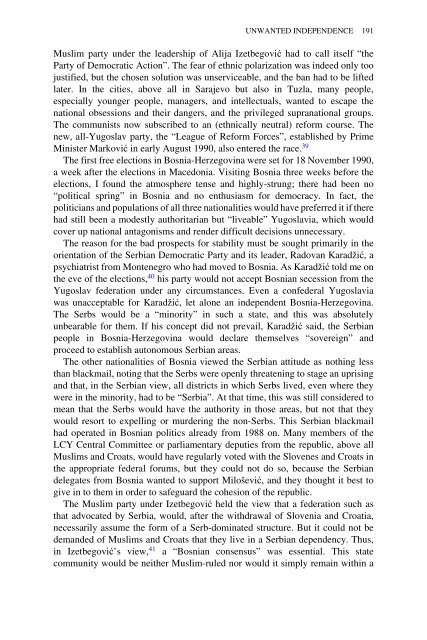Yugoslavia: A History of its Demise - Indymedia
Yugoslavia: A History of its Demise - Indymedia
Yugoslavia: A History of its Demise - Indymedia
Create successful ePaper yourself
Turn your PDF publications into a flip-book with our unique Google optimized e-Paper software.
UNWANTED INDEPENDENCE 191<br />
Muslim party under the leadership <strong>of</strong> Alija Izetbegović had to call <strong>its</strong>elf “the<br />
Party <strong>of</strong> Democratic Action”. The fear <strong>of</strong> ethnic polarization was indeed only too<br />
justified, but the chosen solution was unserviceable, and the ban had to be lifted<br />
later. In the cities, above all in Sarajevo but also in Tuzla, many people,<br />
especially younger people, managers, and intellectuals, wanted to escape the<br />
national obsessions and their dangers, and the privileged supranational groups.<br />
The communists now subscribed to an (ethnically neutral) reform course. The<br />
new, all-Yugoslav party, the “League <strong>of</strong> Reform Forces”, established by Prime<br />
Minister Marković in early August 1990, also entered the race. 39<br />
The first free elections in Bosnia-Herzegovina were set for 18 November 1990,<br />
a week after the elections in Macedonia. Visiting Bosnia three weeks before the<br />
elections, I found the atmosphere tense and highly-strung; there had been no<br />
“political spring” in Bosnia and no enthusiasm for democracy. In fact, the<br />
politicians and populations <strong>of</strong> all three nationalities would have preferred it if there<br />
had still been a modestly authoritarian but “liveable” <strong>Yugoslavia</strong>, which would<br />
cover up national antagonisms and render difficult decisions unnecessary.<br />
The reason for the bad prospects for stability must be sought primarily in the<br />
orientation <strong>of</strong> the Serbian Democratic Party and <strong>its</strong> leader, Radovan Karadžić, a<br />
psychiatrist from Montenegro who had moved to Bosnia. As Karadžić told me on<br />
the eve <strong>of</strong> the elections, 40 his party would not accept Bosnian secession from the<br />
Yugoslav federation under any circumstances. Even a confederal <strong>Yugoslavia</strong><br />
was unacceptable for Karadžić, let alone an independent Bosnia-Herzegovina.<br />
The Serbs would be a “minority” in such a state, and this was absolutely<br />
unbearable for them. If his concept did not prevail, Karadžić said, the Serbian<br />
people in Bosnia-Herzegovina would declare themselves “sovereign” and<br />
proceed to establish autonomous Serbian areas.<br />
The other nationalities <strong>of</strong> Bosnia viewed the Serbian attitude as nothing less<br />
than blackmail, noting that the Serbs were openly threatening to stage an uprising<br />
and that, in the Serbian view, all districts in which Serbs lived, even where they<br />
were in the minority, had to be “Serbia”. At that time, this was still considered to<br />
mean that the Serbs would have the authority in those areas, but not that they<br />
would resort to expelling or murdering the non-Serbs. This Serbian blackmail<br />
had operated in Bosnian politics already from 1988 on. Many members <strong>of</strong> the<br />
LCY Central Committee or parliamentary deputies from the republic, above all<br />
Muslims and Croats, would have regularly voted with the Slovenes and Croats in<br />
the appropriate federal forums, but they could not do so, because the Serbian<br />
delegates from Bosnia wanted to support Milošević, and they thought it best to<br />
give in to them in order to safeguard the cohesion <strong>of</strong> the republic.<br />
The Muslim party under Izetbegović held the view that a federation such as<br />
that advocated by Serbia, would, after the withdrawal <strong>of</strong> Slovenia and Croatia,<br />
necessarily assume the form <strong>of</strong> a Serb-dominated structure. But it could not be<br />
demanded <strong>of</strong> Muslims and Croats that they live in a Serbian dependency. Thus,<br />
in Izetbegović’s view, 41 a “Bosnian consensus” was essential. This state<br />
community would be neither Muslim-ruled nor would it simply remain within a
















